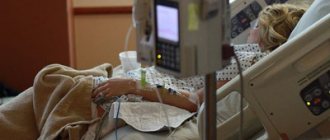Enuresis is usually called urinary incontinence during sleep - nighttime and daytime. This unpleasant disease is diagnosed in children and adults at any age, but adolescents under 15 years of age (up to 3%) and older people are especially susceptible to it.
Cost of urologist services in our clinic
| Initial consultation with a doctor with the highest category | 1000 rub. |
| Consultative appointment with a doctor based on test results and ultrasound results | 500 rub. |
| Ultrasound of the kidneys in standard mode and using Doppler techniques | 1200 rub. |
| Ultrasound of the bladder | 500 rub. |
| Ultrasound of the pelvis using Doppler techniques | 1200 rub. |
| Make an appointment by phone: 8-800-707-15-60 (toll-free) | |
| *The clinic is licensed to remove tumors |
Urologists say that nocturnal enuresis (NE) is curable in many cases, the main thing is to find the cause of the pathology. Therefore, do not hide the problem from doctors - make an appointment with a urologist and undergo an examination.
Why do people pee: the brain argues with the kidneys
The content of the article
The causes of urinary incontinence are well known: enuresis is caused by pathologies of the central nervous system, incoordination of the bladder and brain, nocturnal polyuria (increased urine production) associated with hormonal abnormalities, and kidney disease.
Hormonal causes of enuresis were previously practically not considered, but it is now known that hormone imbalance is the cause of almost half of the cases of the disease. Moreover, the failure can occur at any level - in the pituitary gland, thyroid gland or respiratory organs.
Thus, apnea (respiratory arrest due to adenoids, snoring, obstructive bronchitis, etc.) leads to insufficient oxygen supply to the brain (hypoxia), which in turn leads to a lack of production of vasopressin (ADH), a hormone responsible for the proper functioning of the kidneys.
The less ADH is secreted, the more urine is produced: some patients can accumulate up to 20 liters per night! No bladder can hold such an amount.
In addition, the lack of certain sex hormones leads to weakening of internal muscles, in other words, to their aging. The organs sag and put pressure on the bladder, reducing its volume. This phenomenon is often observed in women during menopause. It has been established that women suffer from enuresis three times more than men.
Scientists say that most patients with enuresis have genetic prerequisites for this. A gene responsible for the development of NE has been discovered. Another cause of enuresis is sleep disturbances, when the patient sleeps “like dead” and does not feel the urge.
Degrees of urinary incontinence
Depending on the symptoms and severity of the condition, there are several degrees of this pathological phenomenon:
- In mild cases, incontinence occurs due to coughing or sneezing, or during physical exertion, and the bladder should be sufficiently full.
- In moderate cases, leakage occurs while running or when standing up suddenly.
- In severe conditions, incontinence can occur simply by walking; the problem can occur even at rest.
Why you need to treat nocturnal enuresis
There is not a single person who would like to sleep in diapers or wake up in a puddle of urine. A constant smell, wet underwear and judgmental glances from even the closest people are the eternal companions of people with NE.
Patients with nocturnal enuresis cannot live a normal life: travel is excluded for them, and they have to sleep alone. This is oppressive, an inferiority complex develops, and the psyche is destroyed.
As for health, enuresis is often only a symptom of a disease that requires mandatory treatment, especially when it comes to the kidneys or hormonal imbalance.
Treatment at the Federal Scientific and Clinical Center of the Federal Medical and Biological Agency
- At the Federal Scientific and Clinical Center of the Federal Medical and Biological Agency, minimally invasive mini-sling operations are performed, and other methods of disease correction are also used;
- The Federal Scientific Clinical Center uses the most modern and effective pharmaceuticals that have been tested in the best clinics in Europe and America and have proven themselves in the world market;
- The center uses equipment from leading global manufacturers;
- Specialists at the gynecological department will help you with various diseases of the reproductive system.
How is nocturnal enuresis treated?
There is no magic pill that could be prescribed to every patient with NE, because the treatment method completely depends on the cause of the pathology. The doctor first sends you for tests (urine, blood) and diagnostics - ultrasound of the bladder and kidneys, x-rays. Then, having received the results, he draws conclusions. Sometimes the data obtained is not enough, then additional research will have to be done.
Treatment of enuresis can be conservative and surgical. If the cause can be eliminated without surgery, then enuresis is treated with medications and psychotherapy, otherwise surgical intervention is required. The help of a psychotherapist is often required even after treatment: many patients have difficulty getting used to life “without diapers.”
Drug treatment can include various drugs: hormonal problems are eliminated with hormone therapy, infections are usually treated with antibiotics. There are medications that reduce urine production at night and restore sensitivity to the nerves of the bladder.
As for operations, there are now many methods that correct pathologies of the urinary system, including low-traumatic ones. Such interventions are carried out through punctures in the abdominal cavity or natural access (urethra), so after them everything quickly heals and is forgotten.
Causes of bedwetting in men
Most often, sleep incontinence in men is diagnosed when they have crossed the age limit of 40–45 years. In addition to age-related changes in the body, the causes of enuresis are:
- neurological diseases, multiple sclerosis, Parkinson's disease;
- panic attacks, low stress tolerance;
- congenital disorders of the anatomy of the urinary organs;
- pelvic organ injuries;
- infectious diseases of the genitourinary system;
- metabolic disorders;
- neoplasms in the pelvis;
- age-related changes;
- taking medications with a diuretic, sedative effect;
- infections accompanied by cough;
- alcohol, drug addiction.
Sleep incontinence is recurrent in nature, dry periods are replaced by manifestations of enuresis. With successful diagnosis and identification of the causes of the condition, symptoms can be eliminated.
Are there pills for enuresis?
Urologists are often asked what medications should be taken for nocturnal enuresis in adults. This question can only be answered by knowing exactly the cause of the disease:
- A drug that contains antidiuretic hormone and reduces nighttime urine production may be prescribed.
- For neurotic enuresis, sedatives and mild antidepressants are prescribed.
- There is a method that involves taking combination drugs containing ephedrine. These powerful medications are available by prescription.
But it is not possible to cure enuresis with dietary supplements, since they do not contain real drugs.
Prevention measures
Manifestations of bedwetting reduce male self-esteem and negatively affect public and personal life. To prevent the occurrence or recurrence of enuresis, it is recommended to adhere to the following rules:
- give up bad habits (smoking, drinking alcohol);
- maintain optimal water balance in the body;
- eliminate physical inactivity, move more;
- enrich the menu with vegetables, fruits and cereals;
- avoid junk food (both in composition and method of preparation);
- normalize sleep and activity patterns.
Most men are in no hurry to see a doctor and are embarrassed by the problem that has arisen. If you ignore the symptoms, the condition will only worsen over time, since the disease itself does not go away. Prolonged incontinence leads to neurosis and is accompanied by insomnia. Timely diagnosis and course of therapy will prevent the development of complications, and at the initial stage will allow you to quickly eliminate symptoms. Self-medication is unacceptable. At the first manifestations, you should immediately visit a urologist.
Enuresis in children
Until the age of 5-6 years, a healthy child can periodically wet the bed, since his mechanism for controlling bladder function is still not working properly. But, if enuresis continues to exist in the future, this is a sign of a disorder.
Enuresis in children can be caused by the following reasons:
- immaturity of brain structures that control the function of the pelvic organs;
- experiences, stress;
- central breathing disorders during sleep;
- obstructive sleep apnea syndrome caused by various reasons (anomalies in the structure of the facial skull, tonsillitis, adenoids, etc.).
Surgery
If you have overflow incontinence caused by a blockage or narrowing of the urethra, your doctor may treat it with surgery to clear the blockage.
For women.
A weak bladder neck or poorly supported urethra can cause stress urinary incontinence and can be treated with surgery. Sling surgeries are performed through the vagina to insert a strip of material—usually mesh—into the tissue between the vagina and urethra. A mesh is a screen-like material that doctors can implant in your body to support your bladder or urethra or repair a hernia. A doctor performs an operation in a clinic. You will receive general or local anesthesia. Most women can leave the clinic the same day, although some may have to stay overnight. Full recovery takes 2 to 3 weeks.
Although sling surgery with surgical mesh, sometimes called a midurethral sling, is generally successful and safe, serious complications can occur in some women. Your doctor can explain the risks and benefits of stress incontinence surgery and what results you can expect. He or she can help you decide if surgery is right for you.
For men.
Stress urinary incontinence in men is sometimes treated with surgery. The surgery includes artificial urinary sphincter (AUS) and male sling surgery. The doctor performs operations in the clinic. You will receive general or spinal anesthesia. Most men can leave the hospital the same day, although some may have to stay overnight. Your doctor can explain the risks and benefits of UI surgery and what results you can expect.
Minimally invasive surgeries are available for men with an enlarged prostate.
Diagnostics
Diagnosing urinary incontinence is not as simple as it may seem. Unfortunately, the patient only sees the result - loss of urine, and its causes can be very different. The main diagnostic role in this disease belongs to interviewing the patient. It is assessed under what circumstances and how long ago urine loss occurs. Next, find out the number of pads or diapers used.
Based on this indicator, we can draw a conclusion about the severity of the disease: 1-2 pads - light, and if more than 5, then severe. If the patient loses urine at night, against the background of a strong urge to go to the toilet or thoughts about it, it is more likely to say that this is urge urinary incontinence. In a situation where urine loss occurs during physical activity, the patient most likely suffers from stress incontinence. Unfortunately, patients often note a combination of factors. Then we are dealing with a mixed form of urinary incontinence.
An important element of diagnosis is a gynecological examination, during which, in addition to standard procedures, special tests are performed. First of all, this is a stress test in which the patient with a full bladder is asked to cough or strain hard. If there is loss of urine during the test, this indicates stress incontinence. In complex cases, a special comprehensive urodynamic study is necessary.
Complications from bladder control problems?
Physical inactivity
Urine leakage can cause a person to slow down or stop physical activity. For example, running, jumping or brisk walking can impair control if someone suffers from urinary incontinence. Or perhaps a woman feels that disposable pads or panties are uncomfortable to move in, so activity may be less fun.
Staying active is important for a person's overall health and can prevent further problems with bladder control. Urinary incontinence can get worse for those who are not physically active. Lack of physical activity can lead to weight gain. People who are overweight or obese are more likely to have bladder problems. Being active can lead to improved bladder health.
Tell your doctor if your bladder control problems are preventing you from being active.
Emotional distress
Unresolved bladder problems can lead to upsetting lifestyle changes. A person may avoid activities that he or she once enjoyed. People may stop going to the movies, meetings, or church because they don't want to use the restroom in the middle of an event or end up in an awkward situation. These changes can lead to depression.
Intimacy issues
Problems with bladder control sometimes cause people to avoid intimacy because they are worried about wetting themselves during sex. Talk to a healthcare professional if bladder control problems are interfering with your sex life. Gynecologists and urologists regularly talk to people about health problems that interfere with sex. A healthy sex life is part of a healthy life.
How common are bladder control problems?
Bladder control problems are common. Almost half of all women experience them at some point in their lives. Women are more likely to develop incontinence during and after pregnancy, childbirth and menopause. These events and the way the female urinary tract is built make incontinence more common in women than in men. However, don't accept incontinence as a routine part of being a woman or aging.
One in three men may accidentally lose urine. A man is more likely to experience incontinence as he gets older, when prostate problems become more common.
Emotional support
Bladder control problems are common, but many people feel too embarrassed to talk about them. At the very least, talk to your doctor about your bladder problems. Your doctor can help you connect with a support group for people with similar problems.
Talk to your family and friends about your incontinence. Your family and friends can also help you find easier ways to use the bathroom regularly. By sharing your struggles, you may discover that other people in your life also have bladder problems.










